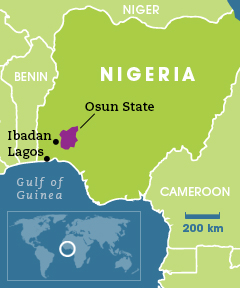By: Jon Spaull
Send to a friend
The details you provide on this page will not be used to send unsolicited email, and will not be sold to a 3rd party. See privacy policy.

In Nigeria, there is just one psychiatrist for every million people — like in many low-income countries, mental health is severely neglected. A WHO survey found that only 20 per cent of Nigerians with mental health conditions received treatment over a 12 month period, and only 1-in-10 of those treated got adequate care.
Just 3 per cent of Nigeria’s health budget goes on mental health. And faced with falling oil revenues, the government is proposing health budget cuts in 2016. So given limited resources, how can the country hope to offer quality, comprehensive psychological care for its rising population?
In this video, we hear from two psychiatrists working at policy and community levels.
Oye Gureje, professor of psychiatry at the University of Ibadan, leads the country’s WHO collaborating centre for research and training in mental health, neuroscience and drug and alcohol abuse. He says the most important single step Nigeria could take to improve care is to make far more use of non-specialist primary health workers. Gureje also argues that there is no option but to engage with spiritual healers, while recognising that much of the treatment they carry out is “harmful”.
Olanrewaju Ibigbami is a psychiatrist in Osun state and head of the only mental health clinic run by the state’s hospital management board. Ibigbami talks about his experience at the clinic and as the only psychiatrist to work with the state’s 52 non-teaching hospitals. The major challenge, he says, is making people more aware of how to access mental health services, and echoes the call for more collaboration with the churches and healers that most people turn to for help.
This Spotlight article features a researcher from INASP’s AuthorAID programme.
This article is part of our Spotlight on Mental health mattersConfigure | Delete













